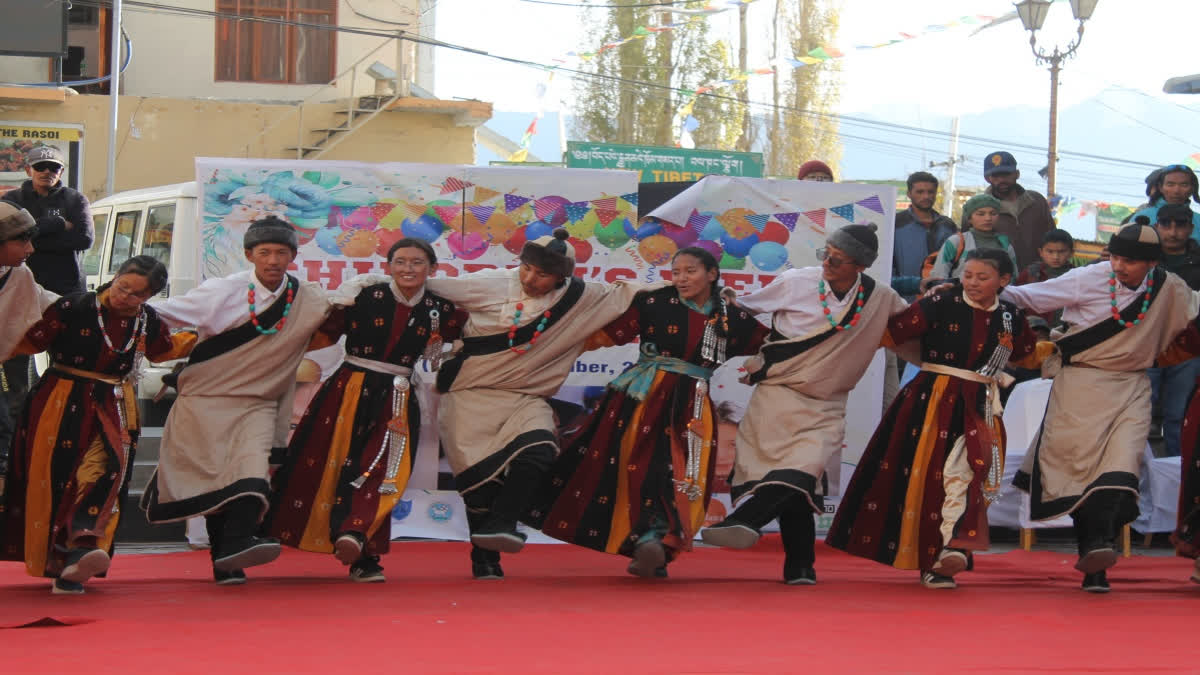Leh: As part of Janjatiya Gaurav Diwas and in observance of Children’s Week, the Department of Social and Tribal Welfare, in collaboration with the Ladakh Nutrition Project, organised a panel discussion today on Substance Abuse Among Tribal Children and Youth (Prevention and Rehabilitation) in main market Leh.
Religious organisations, educational institutions, and NGOs collaborated to address the challenges and solutions related to substance abuse among youth in the region. Alongside the discussion, the event featured a street play highlighting child labour issues and cultural performances. Children’s Week will continue through November 20.
Tsering Paldan, Director, School Education Ladakh, who was chief guest, said, "Parents play an important role in their children's lives, and students also have a responsibility as they move to other places for further studies. We can initiate preventive activities at an early stage, and teachers have a significant part to play in this as well."
"Building resilience among children is crucial, and programs like social, ethical, and emotional learning in Ladakh similar to the happiness curriculum—are designed to foster this resilience. Many teachers in government schools have expressed concerns that parents are not providing adequate support, especially with homework and guidance. Attending parent-teacher meetings is also vital for supporting children's progress," Paldan said.
Prakash Chandra, an addiction counsellor, explained, "Most addictions begin to form between the ages of 9 and 12, often starting in the home environment. Behind every addiction, there is usually some form of deception."
"Addiction develops in four stages: the seeding phase, social and occasional use, regular use, and finally, the addiction phase. About 95 per cent of our thoughts are subconscious, and these thoughts are primarily shaped during early childhood, early teens, and mid-teens. According to my research, 80 per cent of addiction cases start in grades 6, 7, and 8, with many individuals admitting to using the most substances by the eighth grade.
"We need to teach our children accountability, awareness of their surroundings, the importance of boundaries, commitment in relationships, responsibility, discipline, and self-evaluation. Each student should strive to maintain the '5 S's'—study, sports, socialization, spirituality, and skill development," Chandra added.
Mumtaz Hussain, Chairperson of the Child Welfare Committee (CWC), said, "Students in ninth grade, both boys and girls, are at a particularly sensitive age and require focused attention. I believe that after the COVID-19 pandemic, many students have become vulnerable, partly because masks provided a way to hide certain behaviours, like substance inhalation. It can take five to eight months for addicted children to return to a stable condition. Additionally, mobile addiction has become a serious concern, as improper use can lead to significant harm. Parents need to stay vigilant about their children’s activities, the company they keep, and their overall behaviour."
Ajaz Ahmad, Project Coordinator at Save the Children, shared, "Save the Children has been working to support children in Ladakh for the past 40-50 years. Currently, we are implementing a project called Peace Education in Leh district, which provides us with opportunities to engage with children, teachers, parents, and community stakeholders."
"Drug abuse has emerged as a serious issue in Ladakh, and we must strengthen initiatives to address it. Often, children begin experimenting with substances for fun, but it can quickly lead to addiction. This issue is evident among younger age groups, so it's essential to focus on moral and peace education to make school a more engaging and joyful environment. Parents also need to devote more time and attention to their children," Ahmad said.
Inspector Diskit Ladol, Women Police Station informed, "In 2024, we have registered FIRs for 15 cases under the NDPS Act at Leh Police Station. Most incidents occur during the summer when tourism peaks and the supply of substances increases. Additionally, we have seized nine kg of charas and two kg of tablets. We urge all parents to stay vigilant and monitor their children, as many crimes are facilitated through social media."
Fariha Rafiq, Protection Officer, Non-Institutional Care, District Child Protection Unit, Leh, said, "As part of our district child protection services, we focus on supporting children under 18 through various initiatives under Mission Vatsalya, led by the Ministry of Women and Child Development."
"Our work covers all aspects that impact children, with particular attention to substance abuse. In 2021, we launched an initiative called the ‘Yato Club - Help Us to Help You,’ establishing a 15-member club in each school to promote awareness about substance abuse. We also organise monthly awareness and counselling camps in schools and provide training under the 'Nasha Mukt Bharat' campaign. Parents are the first-hand groomers, though we often see cases where family relationships need improvement. Schools, as the secondary support system, have been doing good work," Rafiq said.
Earlier, Chotak Gyatso, Executive Director, Ladakh Nutrition Project said, “The discussion with stakeholders will continue for a week and at the end, we will get feedback and suggestions from the institutions and based on that we are planning to prepare a report and submit to the higher authorities."
